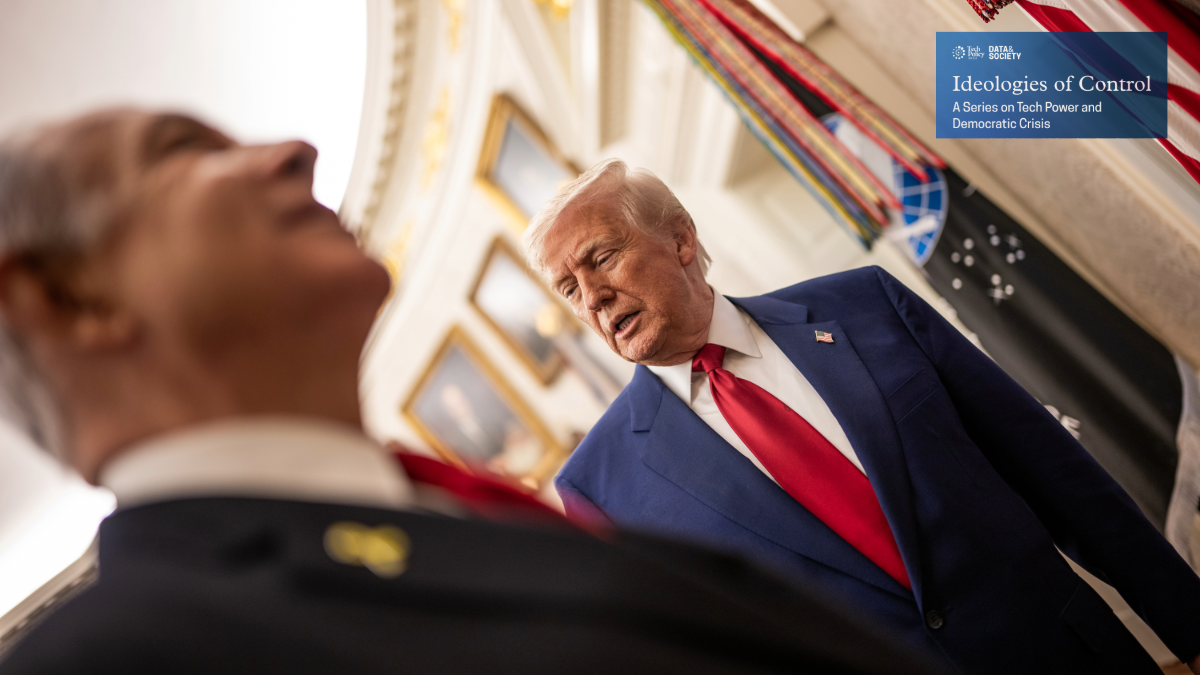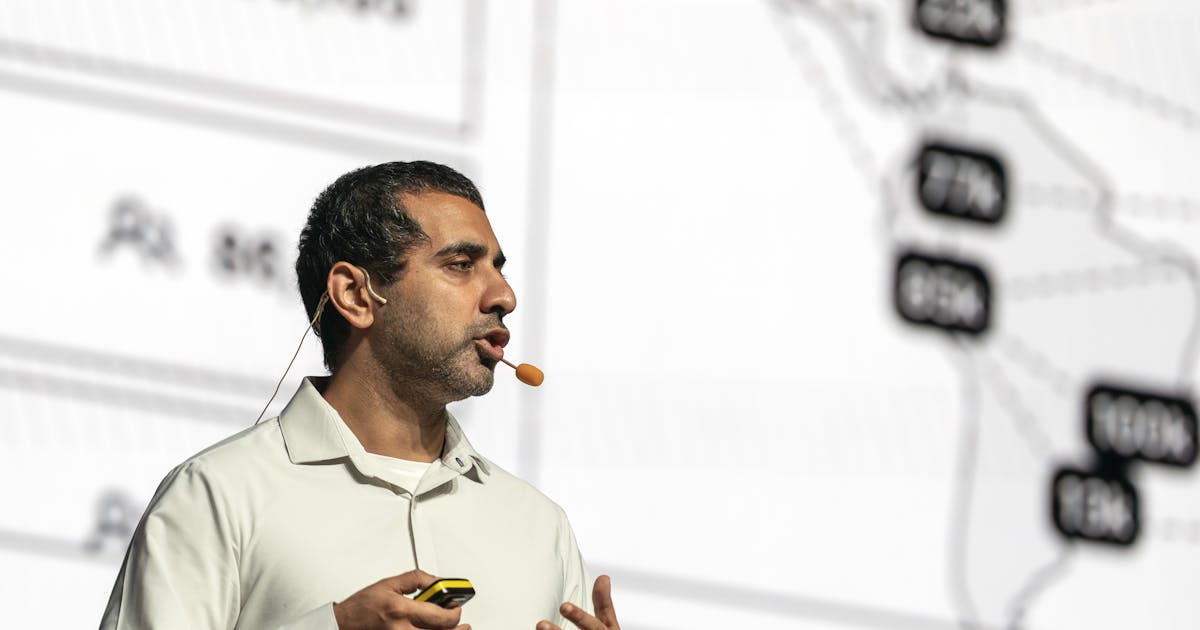The news:
A company called Frontier Valley wants Donald Trump to declare a “national security emergency” so it can take over part of Alameda Point in the San Francisco Bay and build a privately run, AI-focused tech city.
Why it matters:
The project seeks to short-circuit environmental laws and hand federal land to a tech startup — an archetypal “Network State” power grab.
What to watch
If the plan gains traction, it could become a precedent for companies writing their own rules on public land, testing courts, Congress, and California’s ability to stop it.
Donald Trump has used fake emergencies to take over the California National Guard and deploy Marines to Los Angeles. Will he use the same strategy to create a new tech-controlled city in California?
A company called Frontier Valley wants President Donald Trump to declare a national security emergency so it can build a new tech city on the site of a former naval air base in Alameda, an island city in the San Francisco Bay. The proposed project aligns with the Network State, a cultish Silicon Valley movement to create new territories governed by tech companies outside normal U.S. rules and regulations.
Trump’s Gaza Fantasy and the Network State: The Tech-Fueled Future of Privatized Sovereignty | TechPolicy.Press
We’re watching the rise of a new anti-democratic extremism—networked, crypto-financed, and cloaked in the language of freedom, writes Gil Duran.
 Tech Policy PressGil Duran
Tech Policy PressGil Duran

Read More on Trump's Network State dreams
On Sunday, Frontier Valley announced the project in a thread posted to X. The company's website features renderings of new buildings on the former Naval Air Station Alameda.
It also features a draft presidential “executive order” declaring a “national security emergency” to create the project. The draft order, apparently created by the company, directs the secretary of the Department of Veterans Affairs to declare the base “excess” property and transfer it to Frontier Valley. Most of the former base has been transferred to local control through the Base Realignment and Closure process (BRAC).
In a video posted to the website, Frontier Valley founder James Ingallinera described the proposed zone as “an entirely new, independent, MASSIVE independent jurisdiction for accelerating frontier tech.”
The proposal appears designed to capitalize on Trump's campaign promise to build 10 new corporate-run cities on federal land (aka “freedom cities”). Trump, whose idea is clearly a version of the Network State concept, has called for different projects to compete for approval. Frontier Valley is clearly aiming to be a contestant.
The Alameda Naval Base Gambit
Frontier Valley’s target is a 512-acre parcel that was part of the former Naval Air Station Alameda. The company describes the site as “the only available federal property” suitable for their vision of a special economic zone dedicated to artificial intelligence, robotics, and advanced manufacturing.
Frontier Valley positions itself as the solution to America's technological competition with China. It claims the new zone would “unleash America's greatest talent and startups” and serve as “the key unlock for the US surpassing China in the AI and robotics race.”
The proposed zone would operate under what the company calls “the most expedited regulatory code in the US.” But Frontier Valley’s approach — announcing plans for a new tech hub without local or state input and publishing a mock executive order — will likely meet fierce opposition. In a video message, Ingallinera hinted at a looming battle.
“So we are asking you to fight alongside us in the greatest battle that ever has been and ever will be fought for the future of the human race,” said Ingallinera. “So please speak up loudly in support of this project. Share this far and wide on social media and, most importantly, push back as hard as you possibly can against any and all resistance that this project will face.”
Frontier Valley’s proposed executive order would use presidential emergency powers to create new tech-controlled zones on public land. This raises pointed questions about corporate influence over federal property and national security determinations.
Big question: Why is an unknown tech company drafting an executive order to declare a national security emergency and build a new city?
Emergency Powers and Environmental Shortcuts
Frontier Valley's draft executive order would use sweeping emergency powers to bypass normal processes.
It would invoke the Defense Production Act, declare a national security emergency, and seek exemptions from the Endangered Species Act to fast-track the transfer of federal property to private operation. The former Alameda air base is a nesting site for the endangered California least tern, a migratory bird.
The document also outlines a “Government-Owned, Contractor-Operated” (GOCO) model that would maintain federal ownership while granting a private operator up to 10 years of control over the site. The selected operator would act as “an agent and instrumentality of the United States Government,” blurring traditional lines between public and private authority.
The Network State Vision
The Frontier Valley proposal appears to be a concrete attempt to realize the “Network State” concept popularized by tech entrepreneur Balaji Srinivasan. The former Andreessen-Horowitz partner has proposed that corporations should operate quasi-sovereign territories with their own rules and governance structures.
Last year, I wrote about Srinivasan's vision for new tech-run territories in which Democratic voters ("Blues") would be purged from a future San Francisco by a gray-clad tech tribe ("Grays").
The Tech Baron Seeking to Purge San Francisco of “Blues”
If Balaji Srinivasan is any guide, then the Silicon Valley plutocrats are definitely not OK.
 The New RepublicGil Duran
The New RepublicGil Duran

The Network State concept is derived from the writings of Curtis Yarvin, an extreme anti-democracy thinker who laid out a similar vision in a notorious 2008 essay called “Patchwork: A Political System for the 21st Century.” Yarvin, who argues in favor of dictatorship, has long argued in favor of purging the federal bureaucracy through a process called RAGE — "Retire All Government Employees" — which directly inspired Elon Musk's DOGE.
The Frontier Valley proposal drew sharp criticism.
“Do you know how both profound and insane it is that capital interests are explicitly using national security arguments to accelerate the ‘network state’ to carve-up of American sovereignty?” wrote political scientist Van Jackson on Bluesky. “The US has always relied on dark frontier politics to engage in primitive accumulation—dispossession, extraction, and sacrifice—when the market was delivering declining profits. The network state concept is a way to generate new frontiers to exploit and extract from.”
Ingallinera, the founder of Frontier Valley, also founded a co-living company called Hive (formerly Tribe), according to Crunchbase. A Clubhouse app profile bearing his name says his interests include “longtermism, exponential technologies (especially AGI), power laws, existentialism, psychedelics.”
The handle associated with the Clubhouse profile, “@longtermism,” alludes to an emerging Silicon Valley belief system known as TESCREAL. The acronym describes a bundle of new tech ideologies that prioritize hypothetical future humans over present-day concerns and have been criticized for justifying extreme measures in the name of technological progress.
Last July, in a post that went viral on X, Ingallinera declared his support for Trump:
I live in SF, where it’s a social death sentence to voice support for Trump. Regardless, I will be voting for Trump this election, and will voice my support publicly and unabashedly, social and financial consequences be damned.A Spreading Tech Movement
The Frontier Valley proposal represents just one front in a broader campaign to establish Network State territories across the United States and beyond. Network State proponents have proposed similar projects in Santa Barbara County, Greenland, and Guantanamo Bay, Cuba.
One project, Próspera, already exists in Honduras. In Solano County, California, a group funded by tech billionaires has proposed building a "tech utopia" called California Forever. Balaji Srinivasan, the main evangelist of the Network State, has suggested that California Forever is also a Network State project.
California Forever is now angling to become a shipbuilding facility in response to a presidential executive order — using logic very similar to Frontier Valley’s. From a March 21 story in the San Francisco Chronicle:
Rio Vista Mayor Edwin Okamura said on social media that he met with California Forever representatives, retired military leaders and county officials to “discuss a shipbuilding executive order that President Trump is expected to sign shortly.”Last year, a group connected to Srinivasan announced plans to create a tech-funded “city campus” in San Francisco's Hayes Valley neighborhood. But that plan appears to have fizzled.
Alameda: The Test Case?
What makes Frontier Valley particularly shocking is not just its scale or ambition, but its timing and tactics.
By publishing a ready-made executive order during Trump's early months in office — at a moment when the administration is already abusing emergency powers in California — the company is betting that the current political moment offers a unique opportunity to fundamentally alter how the U.S. governs itself.
Frontier Valley would establish a precedent that any corporation with sufficient resources and political connections can write its own laws, seize public resources, and create quasi-sovereign territories.
The draft executive order even includes provisions for replicating the model elsewhere. It envisions “technology-specific zones” across the country that could operate outside normal democratic oversight.
The Network State is no longer a theoretical problem.
It's a live experiment in corporate power, and it’s playing out in real time. Whether Trump embraces this vision of tech-controlled federal zones — or whether Congress, the courts, and California itself will permit such a dramatic expansion of corporate authority over public resources — may determine whether the U.S. remains a democracy.
Will Trump turn federal lands into testing grounds for a new form of corporate feudalism, wrapped in the language of national security and technological supremacy? The answer may reshape American governance.
For more on this subject, see this five-minute video explainer:
.png)




